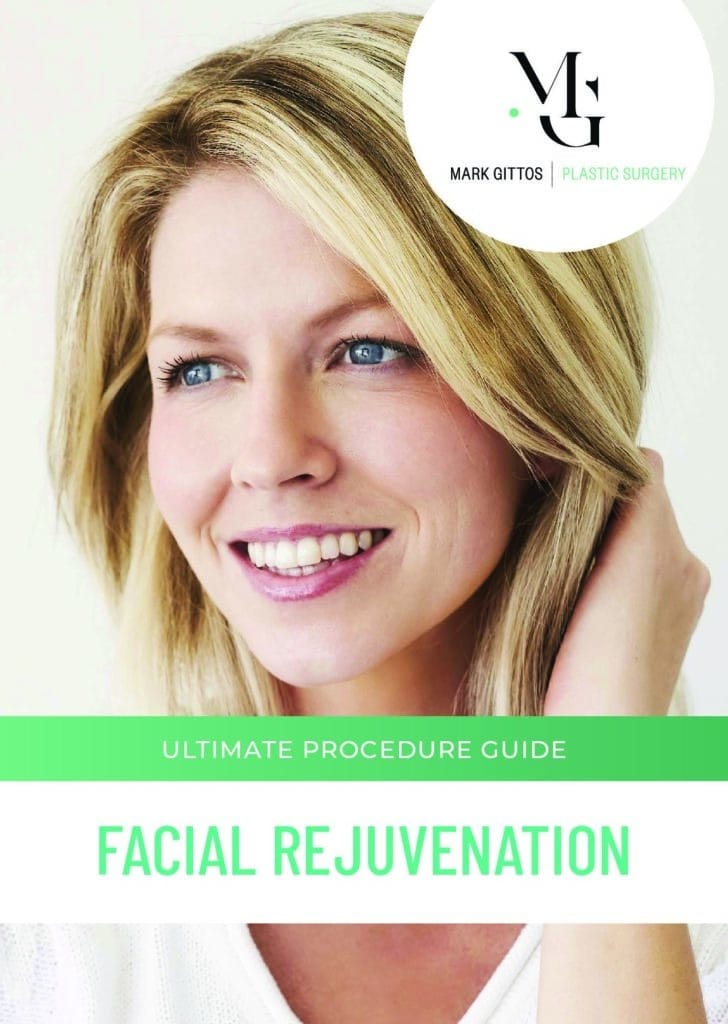Tips and Timeline for Recovery After Facelift Surgery
A facelift surgery can make your face look more youthful and vibrant. It can help rejuvenate and refresh your face and make you look up to 10 years younger. Make sure you choose a surgeon who is highly experienced in face surgery. Dr Mark Gittos is an Auckland Specialist Plastic Surgeon and Facelift expert – here are his Tips and a Timeline for recovery after Facelift Surgery.
Download Dr Mark Gittos’ Guide to Facial Rejuvenation Surgery – Surgical and Non Surgical Anti-Ageing

Timeline for Recovery after Facelift
-
First Day after the Facelift Surgery
After surgery you might feel a bit groggy and nauseous from the effects of the anaesthesia. Your face will be bandaged. In certain cases, Dr Gittos may also use drainage tubes to drain excess fluid. Most patients are discharged from the hospital in 24 to 48 hours after the surgery. Make sure that you have someone to drive you home after the facelift surgery. Also you might want to ask a family member or a friend to stay with you for at least the first two days after surgery to help you around the house.
-
A Few Days after the Facelift Surgery
You might feel uncomfortable but will not feel any significant pain. However, keep taking your pain medication on time. Swelling and bruising might seem more pronounced during the first few days after the surgery. This is a fairly normal part of facelift recovery. You will not see the results of the facelift in the initial days of the surgery. It is also very common to experience tightness around the neck area. Facelift surgery involves tightening the skin. Hence, it will take some time for your face to adjust to the changes. Some patients might get anxious during this phase of recovery. It is important to stay calm. It will help the recovery phase go by quicker. If you can, get someone to help you with the household for the initial days of recovery and rest as much as possible. Once you feel a little better, you can start walking around the house. This will help prevent blood clotting. Avoid all kinds of activities that involve physical effort for at least a month.
-
One Week after a Facelift Surgery
One week after the surgery, you can stop taking pain meds after discussing it with your surgeon. You will slowly start to feel better than you did immediately after the surgery. Start taking a ten to fifteen-minute walk around the house twice a day. The swelling and bruising around your face and neck area are still present. Having patience is the key to a smooth recovery. Keep sleeping on your back with your head in an elevated position. You can also use ice packs to reduce swelling on your face. Make sure to wrap it up in a towel and apply it for a few minutes at a time.
-
Two Weeks after a Facelift Surgery
At the two-week mark, you could return to work if your job is not physically demanding. If it is, you might still want to stay at home for another two weeks. Bruising and swelling will reduce significantly by week two. You can use mineral makeup to cover up the bruising, if this makes you feel more comfortable going out in the public. As the numbness fades away, you might start to feel minor tingling sensations around the incisions. At this point, you can resume taking supplements or blood-thinning medications. You will also feel the urge to scratch your incisions – avoid scratching at all costs. Keep applying the topical ointments Dr Gittos has prescribed.
-
One Month after a Facelift Surgery
You will be able to do almost all the tasks around your house along with gentle exercises. However, you should still stay clear of heavy lifting as well as strenuous exercises. Bruising will be completely gone by week two. You can easily go out in public without wearing makeup. Some patients also report tingling and tightness. It is very normal and you shouldn’t worry about it. Essentially, you will begin to feel like yourself.
-
2 Months after a Facelift Surgery
You have reached the end of your normal recovery period. By this point, the chances are that you will look more refreshed, radiant and youthful. Enjoy the fact that you have some years of your face. You can start with your usual exercise routine and off course, resume all your daily activities.
Download Dr Mark Gittos’ Guide to Plastic Surgery Recovery

How to Have a Smooth Recovery after Facelift
Preparation is the key to a good recovery. The more help you can get around the house, the better it is. Here are a few things you need to do in advance of surgery:
1. Go Shopping and Stock Up on essentials
It’s time to do a bit of shopping. Stock up your fridge with ready-made meals. You can also do meal prep and prepare in advance. Make sure to include plenty of proteins, fruits and vegetables, reduce the salt content and create multiple small batches. Try to have some easy-to-cook and digest food options for the first week or two.
2. Get Your Recovery Clothes Ready
Go through your wardrobe and select plenty of comfortable clothing options that you will be wearing throughout the recovery phase. Choose blouses, shirts and sweatshirts that can be opened from the front. It is best to avoid clothes that are worn over your head. If you don’t have enough comfy clothes, you might want to do some shopping.
3. Prepare Your Recovery Room
Prepare your resting space ahead of time. Make sure to choose a room that is comfortable and can accommodate all the things that you are going to need for several days. If possible, get a recliner. It will allow you to sleep comfortably without the need of stacking pillows under your head. Prepare a table that is within your reach near your bed. Keep your phone, charger, tissues, medications, ointments, water, magazines, remote control for TV/AC, and everything you will need during your recovery.
4. Get your Medical Tests done
Get any lab pre surgery tests done that are required by your surgeon. Nobody wants to be running around during the last week before the surgery.
5. Avoid smoking and drinking alcohol
A month before the surgery, you need to give up smoking and drinking. Also, ask Dr Gittos about reducing blood-thinning medications as well as any herbal supplements. If you take certain medications regularly, it is important to discuss them with your surgeon. Make sure none of your medicines or supplements interfere with the outcome of the surgery.
6. Adopt a Healthy Diet
It is important to take care of your diet before the surgery. Eat a nutrient-rich diet that is low in sodium. Include proteins, vegetables and plenty of fruit. Keep yourself hydrated. Taking care of your diet ahead of time will give you the strength you need for recovery. Good nutrition helps with a smooth and fast recovery period.
7. Build Your Support Network
Get your support system in place. It will keep you motivated. Ask a family member or friend to stay at home with you during the initial days of recovery. It will keep you motivated and allow you to feel supported.
Warning Signs to watch for during Recovery from Facelift Surgery

Here are a few signs you should look out for, during recovery. If any of these persist, you must call your surgeon or medical professional right away.
- If you experience extreme swelling on one side of your face
- If you are experiencing unbearable pain even after taking painkillers
- You notice a pus-like discharge from your incisions- sign of an infection
- Your stitches become loose or are coming out
- You experience bleeding from incisions at any point during a recovery phase
- If you experience blood clotting, it’s time to get some help. A great way to spot blood clotting is when you experience swelling or pain on just one side of your body or leg
- Contact your surgeon if bruising persists after one month
Recovery after Facelift Surgery FAQs
Here is a list of frequently asked questions we get regarding facelift recovery:
Can I sleep on my side after the facelift?
- You can start sleeping on your side in about two to four weeks as per your surgeon’s advice.
Can you talk after a facelift?
- You can talk after a facelift. However, it is best to avoid talking or talk as little as possible for the first 24 to 48 hours after recovery.
How bad does a facelift hurt?
- During the surgery, you will not feel any pain as the surgery is done under anaesthesia. After the surgery, you will experience mild to moderate pain which can be easily tackled with the help of pain killers.
How can I speed up my facelift recovery?
- You can speed up your recovery by following all the post-operative instructions closely and taking good care of yourself.
- Use ice on your face to minimise swelling. Be careful not to ice burn it
- Do not bend over or lift heavy things
- Sleep on your back and keep your head in an elevated position
- Try not to touch your face excessively
- Apply all the topical ointments
How do you wash your hair after a facelift?
- You can wash your hair about 2 to 5 days after the surgery with a mild shampoo. Aim to keep your incisions dry.
How long does the pain last after a facelift?
- Most of the pain will subside in about three days. For some patients, the pain will last for a week. Your surgeon will prescribe you pain killers to combat the pain. Make sure to take them after regular intervals.
How long should you wear a compression bandage after a facelift?
- Wear a compression garment for two weeks straight after the facelift for 24 hours.
How long should I wear the chin strap after a facelift?
- You should wear a chin strap for at least two weeks post-surgery.
How long do facelift scars take to heal?

- Your scars will heal in about six months’ time frame and acquire a whitish colour. It might take up to a year for the scars to fade away completely.
How long does your face stay swollen after a facelift?
- It will take a minimum of six to eight weeks for the swelling to go away completely.
How long does it take for a facelift to settle?
- Your face will start to look fairly normal in about four to six weeks after the surgery.
How long will my face be numb after a facelift?
- It is common to experience numbness for at least six months after getting a facelift.
What should I eat for optimal recovery after facelift surgery?
- Eat plenty of proteins, fruits and vegetables which are rich in fibre. Avoid processed foods that are rich in sodium. Also, drink loads of water and liquids. Good nutrition helps with faster healing and better-looking scars.
When can you wash your hair after a facelift?
- You can wash your hair 48 hours after the facelift. Make sure to use a mild, medicated shampoo.
When will I look normal after a facelift?
- You will start to look fairly normal in about 3 to 4 weeks after the facelift. By week four, most of the swelling and bruising will be gone. If bruising persists after week 3, you can use makeup to cover it up.
Further Reading about Facelift Surgery
Medical References about Recovery after Facelift Surgery
- Speeding up recovery after plastic surgery
- Face-lift page on Mayo Clinic
- Your facelift recovery explained from Day 1 to Day 30 | ASPS
About Dr Mark Gittos FRACS (Plast) – New Zealand Plastic Surgeon
Practice locations in Herne Bay Auckland, Northland and Bay of Plenty – Kerikeri, Whangarei, New Plymouth & Tauranga
Dr Mark Gittos is a leading Specialist Plastic Surgeon and operates a practice in Herne Bay, Auckland and in the UK. The practice focuses on both surgical and non-surgical procedures, each designed to help restore, improve or change a physical characteristic or problem. The first step in every case is to talk through your personal requirements and explore all the options, before deciding on the most effective solution.
Dr Mark Gittos offers high quality, natural-looking cosmetic surgery results and is highly experienced in Breast, Body and Face Surgery having performed over 4000 Surgeries in the last 26 years. With worldwide expertise Dr Gittos is an expert in breast, face and body surgery for men & women.
Naturally, before any treatment is begun, we will explain clearly the advantages and risk factors; so that you have the information you need to make an informed decision that is best for you. Visit the practice to find out more.

NEXT STEPS
Please NOTE: Dr Gittos only performs surgery on non-smoker patients with a BMI less than 30. To check your BMI please visit the NZ Heart Foundation website. For help giving up smoking before surgery visit the Smoke Free website
Do your Research
- Read the Website and Blogs relevant to your procedure
- Browse our Frequently Asked Questions including how to choose a Surgeon for your procedure
- Download and read the FREE Guides to Surgery
What to Bring to your Plastic Surgeon Consultation
- Bring a friend or relative to help discuss the information and your choices
- Take lots of notes and read the documents provided thoroughly
- Dress in simple clothes as you may need to undress for examination
- Bring your medical referral and any relevant medical documents or test results
Book your Initial Surgery Consultation
- A Referral from your GP or specialist is helpful but NOT essential – you can have a consultation without a GP Referral
- Email us or Call on 09 529 5352 to arrange your surgeon consultation appointment.
- Book a consultation with Dr Gittos by paying the Consultation Fee – $350 incl GST
Traveling for Surgery? – Consider post-surgery luxury recovery in a Hotel with LuxeCare
Please contact us to arrange to book a consultation with our Specialist Plastic Surgeon or to speak with our Patient Care Advisor.
Send an enquiry form today or phone 09 529 5352 during Clinic Hours
